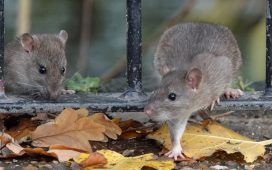Pumba may look a tad ferocious, but the truth is that he’s a big softie.
The big cat lives in Latvia – where it is legal to own Caracals – with his owner Deniss Jegorovs.
Caracals are medium-sized wild cats native to Africa, the Middle East, Central Asia, and some parts of South Asia.
Despite his huge appetite and tendency to want to sneak away from his territory, Pumba is an affectionate cat who hates being alone.
‘Pumba hates being alone so he usually follows us during the day,’ says owner Deniss, 18. ‘He likes sitting next to us and watching TV in the evening.
‘We usually feed him three times a day. He also likes spending time with our two other cats, a Maine Coon and British Shorthair.’
Deniss admits that, while Pumba sometimes hisses at him, he likes to rub against his owners’ feet and sleep next to them.
He adds: ‘Pumba is a very kind animal when you are not annoying him.
‘He does not like to be alone, sometimes he even screams when feels lonely.
‘He spends all day near us watching everything we do. Pumba is a complete member of our family we really love him!’
According to Deniss, ‘Pumba is smarter than regular cat, that is why his communication and signs of love are more frank than other cats.’
And there’s no doubt that walking the big cat attracts some well-warranted attention.
‘People are usually excited to see Pumba for the first time, but some people are scared of him and ask if he is dangerous,’ says Deniss.
‘When Pumba was smaller we were going out with him, some citizens even wanted to take a photo with him.’
Still, caring for a wild cat is no easy feat.
‘Pumba usually wakes up with us in the morning and begins to beg for food,’ says Deniss.
‘In the summer he lives outside, but because we live in Central Europe in the autumn it gets pretty cold, so Pumba lives inside from middle of autumn until the middle of spring.
‘Our main challenge is not to let Pumba escape from our territory, because it happened in the past and he could not find a way home, so we were searching for him for two days.
‘Also in the winter our lake turns into ice and Pumba tries to leave our territory crossing the lake. That is why we keep him inside in the winter.’
MORE : All animals from Tiger King Joe Exotic’s now-closed zoo handed over to authorities
MORE : Everything you should consider before getting a pet











